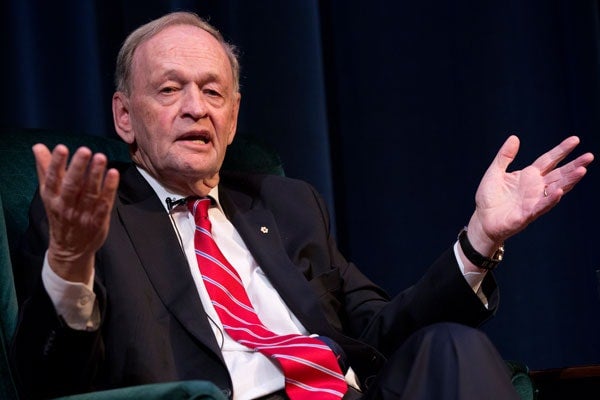
Pearson conference draws two former PMs
Published: April 10, 2013
The Centre for Contemporary International History held a conference on the Lester B. Pearson government Tuesday, highlighted by an extraordinary, 90-minute question and answer session with former prime minister Jean Chrétien.
The conference came on the same day that Trinity College Provost Andy Orchard announced that Trinity Chancellor Bill Graham was donating $5 million to the centre, which will be renamed in his honour.
The day-long conference at the George Ignatieff Theatre not only drew Chrétien but former prime minister John Turner, interim federal Liberal leader Bob Rae, U of T President David Naylor and politicians, senior bureaucrats and media who spoke about the Pearson era. (Click through for a photo gallery of the speakers.) The Pearson government was elected in April, 1963 and ushered in major reforms, including the Canadian Pension Plan, medicare, student loans and a new Canadian flag.
Graham, a former senior cabinet minister in Chrétien’s government, and the former prime minister sat for more than an hour and a half on stage, with Graham facilitating questions from students and the audience of about 150 people.
Chrétien provided fascinating background details on a wide range of issues, including his decision to tell former U.S. President George Bush that Canada would not be joining the war in Iraq. He said he didn’t see enough evidence of weapons of mass destruction: “Not enough even to convince a municipal judge in Shawinigan,” where Chrétien is from.
Chrétien, who was first elected to the House of Commons 50 years ago on Monday, said Bush took the news easily but he had a more difficult time with former British prime minister Tony Blair, who supported the war. “He said ‘we have to get rid of Saddam Hussein, who is a bad man.’ I said if we are getting rid of people we don’t like, who is next, me?”
He explained, why, as a cabinet minister in the Pearson government, he changed the name of the country’s national airline from Trans Canada Airlines to Air Canada. “The first reason is that Air Canada came at the top of the list (in airports), not the bottom like TCA.”
Pearson, Chrétien said, “helped give us a modern Canada” that was generous and respected minorities.” He said “it is not like that now.”
Turner, who was first elected in 1962, shared a picture of himself with Pearson with the audience at lunch and talked about how in 1965 he talked Pearson into creating the first federal department of consumer affairs.
Pearson “rebuilt the party. He was the most amazing guy I’ve ever known,” Turner said.
The conference was divided into two sessions – foreign policy in the morning and domestic policy in the afternoon.
U of T Professor Robert Bothwell, and former diplomat Blair Seaborn talked about Canada’s attempt to avert the war in Vietnam through its membership with Poland and India on the International Control Commission. North Vietnam correctly replied that it could take whatever the U.S. would throw at it and that public opinion would eventually force the Americans to leave.
Brendan Kelly, a U of T PhD student, gave an insightful speech about Marcel Cadieux, a federal bureaucrat and staunch federalist who fought against Quebec nationalism.
In the afternoon, President Naylor spoke about his topic: Medicare in the Sixties: Was it a Revolution? His thesis on medicare as a PhD student turned into a book.
The Bill Graham Centre for Contemporary International History is committed to providing innovative programming, and future conferences promise to be as engaging and enlightening as ‘The Pearson Government: 50 Years On’ was on Tuesday, April 9.



